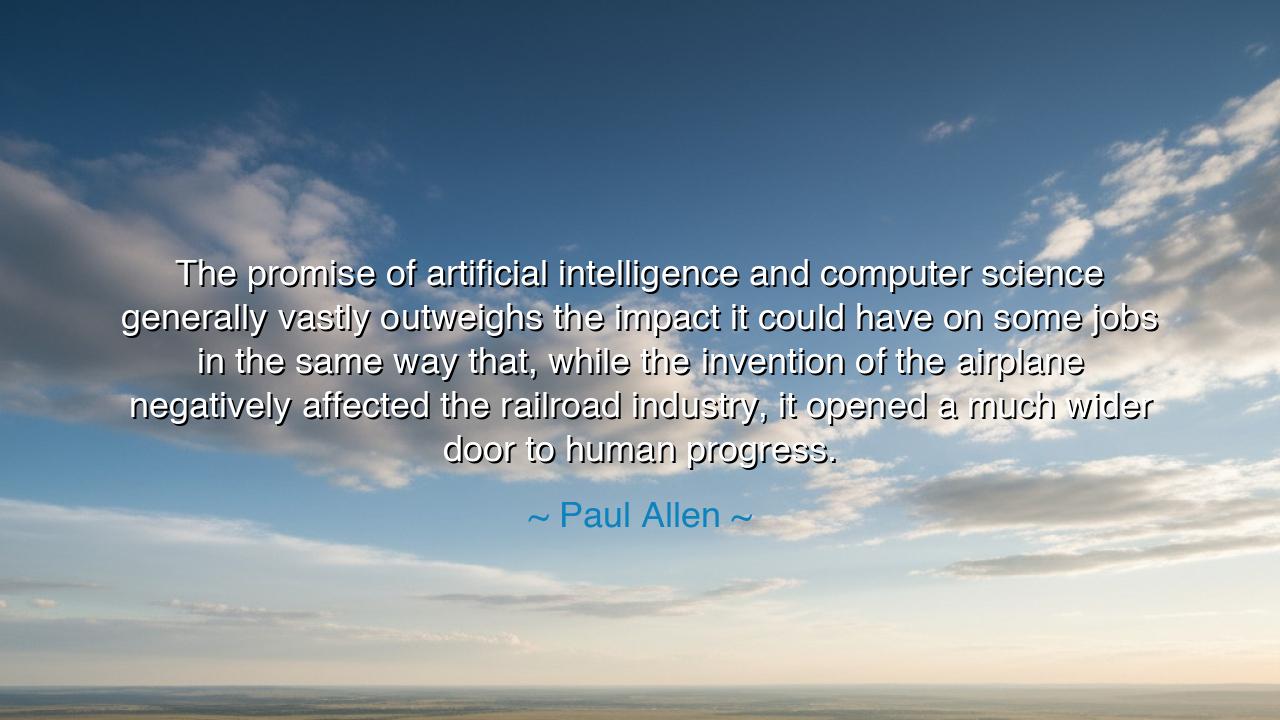
The promise of artificial intelligence and computer science
The promise of artificial intelligence and computer science generally vastly outweighs the impact it could have on some jobs in the same way that, while the invention of the airplane negatively affected the railroad industry, it opened a much wider door to human progress.






When Paul Allen said, “The promise of artificial intelligence and computer science generally vastly outweighs the impact it could have on some jobs in the same way that, while the invention of the airplane negatively affected the railroad industry, it opened a much wider door to human progress,” he spoke as one of the visionaries who helped forge the modern age. His words rise not only from intellect, but from foresight — from a man who had seen how fear often blinds humanity to destiny. He reminds us that change, though it unsettles, is the eternal price of progress. That every age of innovation demands both sacrifice and courage, and that those who look only at what is lost fail to see what may be gained.
Paul Allen, co-founder of Microsoft, lived at the crossroads of two worlds — the mechanical past and the digital dawn. He understood the anxiety that always follows invention: that machines might take our work, that the old ways might vanish, that familiar certainties might crumble. Yet he also understood something deeper — that human creativity does not end when a new tool appears; it expands. When he compared artificial intelligence to the airplane, he was calling upon history’s witness: that every revolution brings both destruction and deliverance. The railroads that once carried civilization across continents gave way to wings that carried humanity across the world — a transformation painful to some, yet magnificent for all.
The heart of his message lies in this truth: that technology is not the enemy of humanity, but its extension. Just as the hammer amplifies the strength of the hand, and the telescope magnifies the reach of the eye, so too does artificial intelligence amplify the mind. To fear such tools is to deny the essence of what makes us human — the unending impulse to create, to improve, to transcend. Allen saw that while machines may change the nature of work, they cannot replace the human capacity for vision, ethics, and wonder. The promise of AI is not to strip life of meaning, but to open new realms where imagination may dwell.
History has often repeated this same tale. When Johannes Gutenberg invented the printing press, the scribes of Europe trembled. Their livelihood, their art, their status — all seemed threatened. But through that act of disruption came the Renaissance, the Reformation, and the spread of knowledge to millions who had once lived in darkness. So too, the industrial revolution displaced the craftsman, yet it gave birth to modern science, medicine, and art. Always, the pattern is the same: the old form gives way, but the spirit endures, renewed through challenge. Paul Allen, like the thinkers before him, understood that the cost of innovation is temporary, but its blessings are eternal.
In his comparison between the airplane and the railroad, Allen gives us a parable of evolution. The railroads were marvels of their time — engines of commerce and culture — yet the world did not end when they declined. It expanded. Humanity took to the skies, shrinking continents into hours, connecting hearts and minds that once seemed worlds apart. So it shall be with AI. Certain tasks will fade, certain industries will change, but a new landscape of discovery will arise: cures for diseases once thought eternal, solutions to crises that baffle the present age, and new frontiers of art and thought that no one yet imagines.
Yet his words are not naive. They carry a warning wrapped in hope. For though the promise of technology is vast, its fulfillment depends on the wisdom of those who wield it. Without ethics, power corrupts; without compassion, knowledge becomes cold. Allen’s vision of artificial intelligence is not a machine that rules humanity, but one that serves it — an instrument through which the better angels of our nature might flourish. He calls upon us to be stewards, not slaves, of our creations: to shape them with conscience, to ensure that progress uplifts rather than diminishes.
And so, dear seeker, take this as both guidance and challenge. Do not fear the birth of the new, nor cling too tightly to what must pass. Instead, look with wonder upon the tools of your age, and ask not only what they can do, but what they can make of you. Let your curiosity outweigh your fear, and your imagination lead your labor. For as Paul Allen teaches, every invention — from the wheel to the web, from the engine to artificial intelligence — is but another step in humanity’s ascent toward its highest self. Embrace change as your ally, for it is the wind beneath the wings of progress. The world moves ever forward, and those who dare to dream with wisdom are the ones who carry it toward the light.






AAdministratorAdministrator
Welcome, honored guests. Please leave a comment, we will respond soon